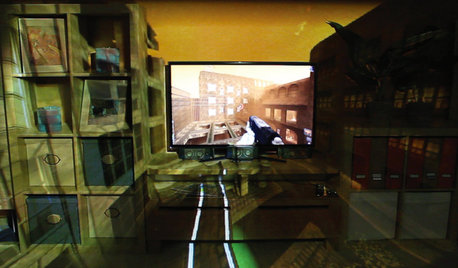Are you a Computer Systems Analyst?
MizAnnThrope
11 years ago
Related Stories

HOME TECHDoes Your Home Need an Operating System?
New technologies hope to unify the lawless frontier of home-automation products. Would they work for you?
Full Story
FUN HOUZZGeek Lab: How to Build a Steampunk Cat Transit System
Give your kitty another avenue for fun with a tubular walkway system that lets him go his own way
Full Story
HOME TECHTurn Your Smart Phone Into a Home Security System
Monitor your home a less expensive way by putting your phone and some new gadgets to work
Full Story
HOME TECHEmerging Virtual-Reality Home Systems Might Blow Your Mind
Get near-total immersion in home entertainment with virtual-reality gadgets worthy of a sci-fi flick, coming soon
Full Story
ORGANIZINGWant to Streamline Your Life? Get a System
Reduce stress and free up more time for the things that really matter by establishing specific procedures for everyday tasks
Full Story
HOME TECHTote Your Tunes to Any Room With a Portable Wi-Fi Sound System
Free your home's music setup from wires with Wi-Fi speakers that let you take high-quality audio anywhere
Full Story
ORGANIZING8 Steps to a Winning Filing System
When you streamline your paperwork and digital files for easy use and maintenance, it's an organizational triumph
Full Story
HOUSEKEEPING5 Steps to Improve Your Heating System Now
Increase your heater's efficiency and safety for lower energy bills and greater peace of mind this winter
Full Story
MOST POPULARGet Ready for the Smart Coffee Table
Intelligent tables with touch screens are reaching the consumer market, with all the power of personal computers and more
Full Story
HOME TECHPlug Into Home Power Monitors That Pay for Themselves
Stop throwing away money on wasted electricity with help from new monitors that work with your phone or computer
Full StoryMore Discussions









3katz4me
amj0517
Related Professionals
Aspen Hill Interior Designers & Decorators · Duluth Furniture & Accessories · Manhattan Furniture & Accessories · Topeka Furniture & Accessories · Pinehurst Furniture & Accessories · Lake Magdalene Furniture & Accessories · Jacinto City Furniture & Accessories · Richmond Custom Artists · Florida City Lighting · Lancaster Lighting · San Francisco Lighting · El Mirage Window Treatments · Patchogue Window Treatments · Rockledge Window Treatments · Rolling Meadows Window TreatmentsJamie
Jamie
3katz4me
funkyart
jmc01
Jamie
sweeby
MizAnnThropeOriginal Author
sweeby
jmc01
sweeby